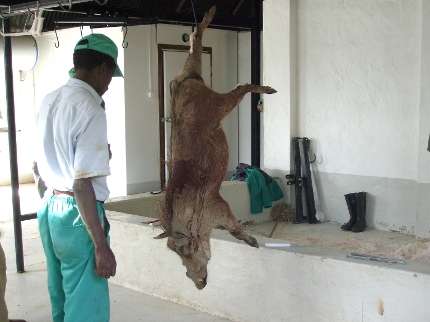South African hunting farms increase social tensions in the rural areas

In South Africa the number and size of commercial game farms where tourists can pay to hunt for large wild animals is increasing. The owners claim that they make a contribution to nature conservation, economic growth and employment opportunities. However, NWO researcher Femke Brandt concludes that the hunting farms lead to tensed relationships in rural areas between white farmers and black farm workers. She defended her PhD thesis on Wednesday 26 June 2013 at the VU University Amsterdam.
Anthropologist Brandt investigated the changing power relationships between farmers and farm workers in the arid region of Karoo. She travelled with the hunting parties, interviewed dozens of farmers, farm workers and civil servants and followed many of them intensively over a one-year-long period. Foreign guests pay up to several tens of thousands of euros for a few days of hunting zebras, lions, buffaloes and other wild animals. Each year the commercial hunting in the Eastern Cape generates tens of millions of euros.
No longer a 'home feeling'
The large-scale switch to trophy hunting has had drastic consequences for the landscape and the relationships between the people who live and work there says Brandt in her PhD thesis. 'The new, private wild landscapes are areas covering thousands of hectares that are surrounded by high fences, where farm workers do not feel at home and, forced or otherwise, leave. Tens of thousands of them have moved to the overcrowded townships where they have hardly any future prospects. This is a major change compared to the former traditions: since the nineteenth century the Africans, after they have been driven from their lands by the colonists, went from farm to farm working for the whites and also dwelling there under the paternalistic regime of the farmer.'
The choice to start game farms is strongly linked to the history of the country, says the researcher. 'Many white farmers in South Africa have a considerable affinity with hunting and its associated rituals. For them the hunting game means a temporary release from a world in which they feel they are a stigmatised group under the ANC administration. Farmers present the landscape as a nostalgic and romantic place in which the emptiness rules. However, in practice this means that the presence of other local residents must be masked as much as possible because in reality, such a landscape does not exist.'
Counter-productive policy
The current ANC government is focusing on restoring the unfair relationships between blacks and whites by giving both land and employment rights to black farm workers. Brandt's conclusion, however, is that this is leading to more social tensions as a result of which the redistribution of land and the restoration of social relationships is in fact being hampered: many jobs are disappearing and farmers are increasingly working with temporary personnel. Brandt: 'The white ruling elite is increasingly coming under pressure and feels threatened. Consequently the landowners and farmers are searching for a way to legitimise their position in society.'
In the neighbouring province of Western Cape, strikes and protests recently took place that were organised by farm workers on wine and fruit farms. Brandt's findings emphasise that the expansion of the game industry must be seen in the context of such tense relationships and the increasing division between members of the national working class and between them and migrant workers from the neighbouring country of Zimbabwe, for example.

















